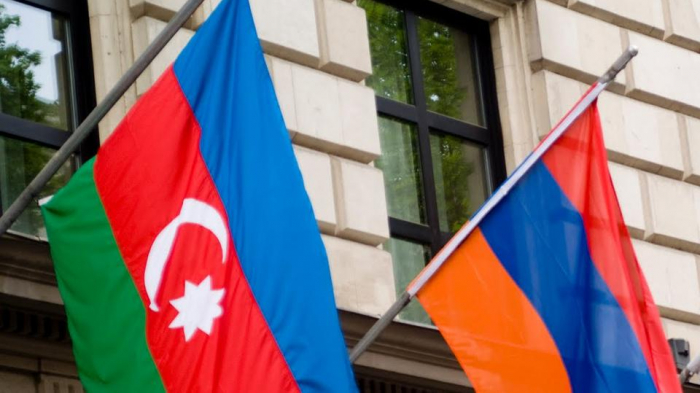The normalization process between Azerbaijan and Armenia, which has regained momentum in the South Caucasus, is moving in three directions. Firstly, the discourse surrounding regional transportation and communication lines has resurfaced. Second, the US and EU have become more active during the normalization process, but this activity has had a negative effect on the process. Third, it became clear that Armenia and Azerbaijan had reached agreement on several subjects in the text of the peace treaty.
'Crossroads of Peace' appears to be empty declaration
The ongoing diplomatic process over last two years between the parties in Brussels was interrupted by a quadripartite meeting in Granada between the presidents of Armenia, France, Germany, and the European Council. While Azerbaijan did not oppose to the continuation negotiations in Brussels in a general sense, Azerbaijani President Ilham Aliyev, who was dissatisfied with the Granada declaration, suggested that the peace talks continue in Georgia.
Two significant advances in Azerbaijan-Armenia peace talks took place on Oct. 26 during the "Silk Road" international summit in Georgia. First, during the conference, Azerbaijani Prime Minister Ali Asadov and Armenian Prime Minister Nikol Pashinyan met behind closed doors, indicating that President Aliyev's proposal had been realized. Second, at the conference, Pashinyan presented a map titled "Crossroad of Peace" that reflects Armenia's approach on regional transportation and communication. This statement represented Armenia's position on Azerbaijan's proposed Zangezur corridor. However, Armenia's Crossroads of Peace, according to Farid Shafiyev, chairman of the Azerbaijan Center for the Analysis of International Relations (AIR Center), is a mostly meaningless declaration, rather than a project like the Zangezur corridor.
Pashinyan made this rushed comment just after the groundbreaking agreement for the new Aras River route between Azerbaijan and Iran. After a long period of resistance from Armenia, Azerbaijan reached an agreement with Iran and agreed that the route would go through Iran. Armenia may lose the opportunity to participate in regional transportation lines if a new route through Iran is constructed. In fact, Hikmet Hajiyev, an Azerbaijani presidential aide on foreign policy, delivered a statement indicating that the Zangezur Corridor had lost its appeal to Azerbaijan. So, Pashinyan's remark arose from two developments: To reverse the process in Armenia's favor if the route is opened through Iran and to do this through a path recommended by Armenia rather than a project proposed by Azerbaijan and Türkiye. Among these factors is the desire to remove Russia from the process. However, the fact that Azerbaijan-phobia and Turkophobia remain widespread in Armenia raises security concerns related connectivity via Armenia.
Activity of US, EU detrimental to the peace process
In recent years, two significant developments have unfolded under the banner of regional cooperation and normalization. First, during the Azerbaijan-Armenia normalization process, there has been a noticeable inclination towards a more pro-Armenian stance from the West. Second, Western powers have expressed dissatisfaction with growing cooperation among the states in the region. During the ongoing process, the 3+2 meeting held in Iran and the subsequent agreement on a new road through Iran faced objections from the US. The paradoxical position to the Iranian-Armenian rapprochement in the period after Baku's 2020 Karabakh victory, coupled with Iran's decision to increase the previously agreed unfreeze of funds from $6 billion to $10 billion, raises questions about the sincerity and consistency of this policy.
The main expectation of the Western alliance is to exclude regional states and act as a mediator between Armenia and Azerbaijan. More precisely, to play the role of Armenia's guarantor in peace negotiations. In fact, Armenia clearly wants the West to play the role of guarantor.
Armenia delaying peace agreement
While the EU and US were criticizing Azerbaijan, Armenia postponed its response to Azerbaijan's peace offer for two months and it was conveyed to Armenia in September. Azerbaijani President Aliyev stated that there are no longer obstacles to Azerbaijan and Armenia signing a peace treaty. The Azerbaijani Foreign Ministry declared that it is ready for direct discussions without a mediator.
Prime Minister Pashinyan and Armenia's foreign minister disclosed that the parties struck an agreement on three principles. The first principle involves mutual recognition of territorial integrity, specifying Armenia's territory as 29,800 square kilometers and Azerbaijan's as 86,600 square kilometers. The second principle is rooted in the 1991 Alma-Ata Declaration, serving as the political foundation for border delineation between Armenia and Azerbaijan, based on maps from the General Staff of the Armed Forces of the former Union of Soviet Socialist Republics (USSR) from 1974 to 1990. The third principle, which focuses on the reopening of regional communications, is guided by principles such as sovereignty, jurisdiction, reciprocity, and equality among the countries involved. These are three of five principles offered by Azerbaijan two years before. However, Pashinyan did not make any specifications on the unagreed-upon principles and later refused to discuss a peace agreement with Azerbaijan without the participation of a third party.
To conclude, with Azerbaijan regaining its sovereignty over Karabakh, peace talks between the parties have gained momentum. However, Pashinyan's Crossroad for Peace map is only a declaration. According to the map given by Pashinyan, the goal is to enhance Armenia's transportation and communication networks. Armenia might need Western investment. Azerbaijan, on the other hand, has made the required investments in the Zangezur corridor. As a result, the Zangezur corridor appears to be more feasible, and Armenia still has a chance to be part of regional transportation project.
AzVision.az
More about:
















































